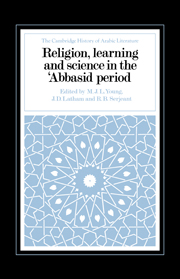Book contents
- Frontmatter
- Epigraph
- Contents
- List of plates
- Editorial preface
- List of abbreviations
- Map Literary, political and religious centres in the ʿAbbasid period
- 1 Sunnī theology
- 2 Shīʿī theological literature
- 3 Ibāḍī theological literature
- 4 Quranic exegesis
- 5 The prose literature of Ṣufism
- 6 Philosophical literature
- 7 Arabic lexicography
- 8 Arabic grammar
- 9 Islamic legal literature
- 10 Administrative literature
- 11 Arabic biographical writing
- 12 History and historians
- 13 Faṭimid history and historians
- 14 Mathematics and applied science
- 15 Astronomy
- 16 Astrology
- 17 Geographical and navigational literature
- 18 The literature of Arabic alchemy
- 19 Arabic medical literature
- 20 Al-Kindī
- 21 Al-Rāzī
- 22 Al-Fārābī
- 23 Ibn Sīnā
- 24 Al-Bīrūnī and the sciences of his time
- 25 Al-Ghazālī
- 26 Christian Arabic literature in the ʿAbbasid period
- 27 Judaeo-Arabic literature
- 28 The translation of Greek materials into Arabic
- 29 Didactic verse
- Glossary
- Bibliography
- Index
21 - Al-Rāzī
Published online by Cambridge University Press: 05 July 2014
- Frontmatter
- Epigraph
- Contents
- List of plates
- Editorial preface
- List of abbreviations
- Map Literary, political and religious centres in the ʿAbbasid period
- 1 Sunnī theology
- 2 Shīʿī theological literature
- 3 Ibāḍī theological literature
- 4 Quranic exegesis
- 5 The prose literature of Ṣufism
- 6 Philosophical literature
- 7 Arabic lexicography
- 8 Arabic grammar
- 9 Islamic legal literature
- 10 Administrative literature
- 11 Arabic biographical writing
- 12 History and historians
- 13 Faṭimid history and historians
- 14 Mathematics and applied science
- 15 Astronomy
- 16 Astrology
- 17 Geographical and navigational literature
- 18 The literature of Arabic alchemy
- 19 Arabic medical literature
- 20 Al-Kindī
- 21 Al-Rāzī
- 22 Al-Fārābī
- 23 Ibn Sīnā
- 24 Al-Bīrūnī and the sciences of his time
- 25 Al-Ghazālī
- 26 Christian Arabic literature in the ʿAbbasid period
- 27 Judaeo-Arabic literature
- 28 The translation of Greek materials into Arabic
- 29 Didactic verse
- Glossary
- Bibliography
- Index
Summary
BIOGRAPHY AND RELIGIOUS VIEWS
Medieval authors have left confused and contradictory biographical accounts of Abū Bakr Muḥammad b. Zakariyyāʾ al-Rāzī (Rhazes), the most original physician–philosopher among the Arabic-speaking peoples. He was born in Rayy (near modern Tehran) probably in 251/865. Physicians, he believed, should practise in great cities which abound in patients and skilful medical men; hence his sojourn in Baghdad, where, in his youth, he studied and practised medicine at its hospital (bīmāristān). Later he returned to Rayy, at the invitation of its governor, al-Manṣūr b. Isḥāq, to assume responsibility as director of its hospital. To this ruler al-Rāzī dedicated his al-Kitāb al-Manṣūrīfīʾl-ṭibb (Liber ad Almansorem) and al-Ṭibb al-rūḥānī (“Spiritual Physic”). These two books were meant to be complementary: the former treats of diseases of the body, the latter, diseases of the soul.
Having achieved fame in Rayy, al-Rāzī returned to Baghdad to become head of its newly founded al-Muʿtaḍidī hospital, named after al-Muʿtaḍid (reigned 279–89/892–902). On account of political events, and in relation to high-ranking positions he had held, he resided on several occasions either in Baghdad or Rayy, but spent the last years of his life in Rayy suffering from glaucoma (al-māʾ), until he became blind and died in his birthplace around 313/925 or 320/932.
Al-Rāzī's self-restraint and modesty are best expressed in his own words, in al-Sīrah al-falsafiyjah:
I have neither shown avarice nor extravagance; nor have I had any disputes or quarrels; nor have I ever acted unjustly against anyone. […]
- Type
- Chapter
- Information
- Religion, Learning and Science in the 'Abbasid Period , pp. 370 - 377Publisher: Cambridge University PressPrint publication year: 1990
- 1
- Cited by



